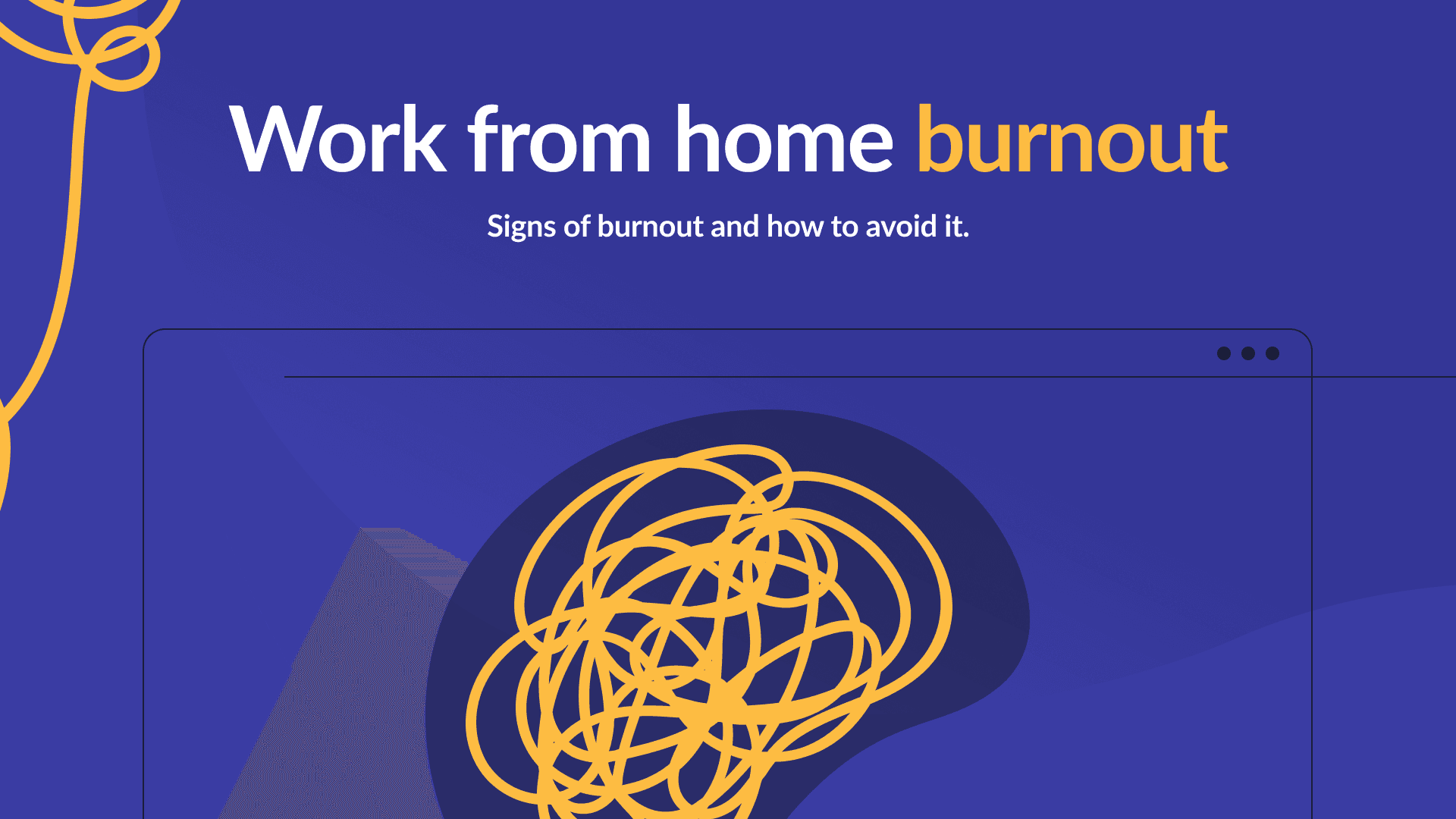Work From Home Burnout: Causes And Preventions
Working from home can be great, right? You have the flexibility to set your own hours, take breaks whenever you like, and not worry about getting to and from work every day. However, if you aren’t careful, all that independence can quickly lead to burnout.
So, if you want to learn more about work from home burnout, including the signs of burnout and how to avoid it, keep reading the following article!
You can read more about virtual team building activities on our blog Top 20 Virtual Team Building Activities!

What is a work from home burnout?
A state of home burnout might set in if you’ve been under stress for an extended period and haven’t been able to control it.
When dealing with many work obligations, it’s easy to experience burnout and feel emotionally depleted to the point that you can’t function in other areas of your life.
Exhaustion on all fronts, mental, physical, and emotional, from stress, is what we mean when we talk of burnout.
In addition, experiencing burnout can make you feel demotivated, despairing, and resentful, which can negatively impact your productivity.
What are the symptoms of burnout?
It’s easy to get wrapped up in your job and forget to take breaks when working from home. And if your environment, thoughts, and actions constantly put your nervous system through a problem-reaction-solution cycle, you’ve just opened the door to burnout.
So, without further ado, here are some of the most typical signs of burnout:
1. Fear and anxiety
If your anxiety and worry are related to how you’re doing at work, it can be very debilitating. The anxiety and pressure may subside while you’re at home doing things you enjoy, but it’ll be back in full force when you return to work obligations.
In addition, anxiety can make it challenging to concentrate and complete tasks. So, if you aren’t getting as much done as usual, or if the quality of your work has decreased, it may be time to take a break.
2. Isolating
Neglectful or lonely feelings, a lack of interest in things, and an inability to find pleasure in life are all symptoms of burnout. Burnout makes you lose interest in everything, and you’d rather be in your comfy bed or couch with your favorite show than socialize with others.
In addition, because of your frustration and hectic schedule, you may feel like you want to shut yourself away from everyone, which can lead to increased time spent alone and a decline in social connections.
3. Complete and utter fatigue
One of the most typical symptoms of burnout is an overwhelming sense of tiredness that permeates all aspects of your life.
It’s possible that you’ll experience constant feelings of exhaustion and sleepiness, and you may find that even performing regular tasks takes significantly more time than usual.
In some cases, this causes us to become so exhausted that we pass out in the middle of the street and be unable to move for a while afterward.
4. Poor performance
When you’re feeling burned out, you may be tempted to increase your effort despite not producing any results.
Your efforts aren’t paying off, so you might be tempted to crank out a few extra hours each week, which is especially undesirable when you’re already feeling burned out.
To move about as you usually would becomes a challenge. In addition, a lot of time and energy are required for certain activities such as grocery shopping, celebrating holidays with family, or simply navigating a crowded public place.
5. Unmotivated or dissatisfied with the current job
On certain days, it’s difficult to muster the motivation to get out of bed and begin a day of work. The old you seem to have lost some of its force.
You used to be capable of anything, but now you find that you no longer have the strength to continue.
At first, you were able to ‘make sense of it,’ but now your body is telling you to stop, and your logic has completely failed you. In addition, there’s an apparent lack of enthusiasm for your work.

How to prevent work from home burnout in 10 easy steps?
It’s no secret that working from home has its challenges. Many of us find it hard to strike a good balance between our professional and personal lives because of the blurring of the lines between the two. To top it all off, many of us are already worn down by our day-to-day personal responsibilities. So, how to avoid burnout working from home?
Here are 10 suggestions to help you prevent it If you’re a home-based worker who’s experiencing burnout:
1. Set boundaries
One of the best things you can do for your well-being is to establish clear rigid boundaries between work and your free time.
On average, employees who work remotely or do most of their job at home put in more hours per week than their coworkers who are physically present in the office.
Therefore, discussing your work hours and schedule openly with your supervisors and coworkers is essential.
Then, when your workday is done, you should stop what you’re doing and concentrate on something other than work.
2. Maintain social connections
Feeling supported is impossible to achieve without a solid social network. It’s crucial to make an attempt to connect with others, even if just online, when working from home because of the isolation that might result.
So, make plans to check in with colleges, participate in virtual happy hours or meetups, or become active in a work community or forum devoted to your hobbies and passions.
A strong team built on a foundation of trust in one another has a lower risk of burnout and is more likely to succeed.
3. Establish a daily routine
Maintaining a regular pattern might help you feel more in control of your day and increase your efficiency.
If you want to get more done throughout your workday, make a personalized to-do list and start your day by reading over the list and keeping it close by for quick reference.
Review your accomplishments and create tomorrow’s plan before calling it a day. You can rely on this to keep you focused and on course.
4. Take time to exercise
Reducing mental and emotional strain through movement and regular physical activity is highly recommended.
It may take a little more effort than usual, but you can accomplish this by going for a run around the neighborhood, stretching in your living room or garden, or walking the dog.
Being physically active on as many days of the week as possible is also encouraged, so get in the habit of setting aside 30 minutes at least five days a week.

5. Turn off your devices after work hours
If you want to feel like you have a handle on things in both your professional and personal life, it’s crucial to create and adhere to a schedule that allows you to do so.
When the workday is over, it’s vital to disconnect from work entirely.
This includes not only not checking work email but also not working on projects or even thinking about work. Instead, focus on self-care in the evenings so you can face the next day with renewed vigor.
6. Make sure you’re getting enough rest
Sleeping enough during the week can help you avoid burnout at work. Good sleep hygiene includes establishing a bedtime routine, avoiding coffee and alcohol in the hours before sleep, and slowing down at the end of the day.
Our ability to reason and get things done is diminished by lack of sleep. Distraction, poor decision-making, and unstable emotions are all possibilities.
Also, your health is at risk. Our health depends on getting enough sleep on a wide range of levels.
7. Don’t be afraid to ask for assistance
A smart way to prevent burnout is to reach out for assistance when you need it. If you’re feeling overwhelmed at work, it’s best to talk to your supervisor about what to do.
Also, if you think you’re going to require help getting your task done on time, don’t be afraid to ask a coworker for it. In addition, if stress is all you can sense, it’s time to take a break.
8. Protect your mental wellbeing
Protecting one’s mental health is essential in the struggle against work burnout. It’s easy to put other people’s needs before your own when you’re overloaded with work, but it’s important to remember to prioritize your needs from time to time.
This could mean taking a break to exercise, changing the music, or reading a few pages. Do the things that make you happy on a consistent basis.
You should compartmentalize your work life and personal life. This includes ignoring work emails outside regular business hours.
9. Determine regular business hours
Regular office hours can help you detach from work if you have problems doing so. Strive to maintain an office lifestyle. Turn off all alerts and set up an out-of-office reply for when you’re not available.
This way, everyone—including you, your clients, and your coworkers—will know that your office is closed for the day, even if you’re just lounging at home.
Create a set of reliable work hours and let your coworkers and customers know about them in advance to avoid misunderstandings.
10. Stay hydrated and eat well
The foods that you put into your body can have a significant impact on how you feel overall as well as how much energy you have throughout the course of the day.
Therefore, it is essential to eat healthily and consume an adequate amount of water in order to keep your concentration and energy levels at a consistent level throughout the day.

To wrap up
Burnout is on the rise among those who work from home, and it’s more challenging than ever to avoid becoming a statistic. But now that you know what it comprises, you may take steps toward your goal of increased well-being and less stress. In addition to making you feel better, this will give you a much-needed productivity boost.
Read our article Freelance Vs. Full-time Employee and you can about the differences between a freelancer and a full-time employee here.
